Games on a Network¶
Fix a 2x2 game. Each agent plays this game with her neighbors in a network.
At each step:
One agent (the focal agent) is chosen at random to adopt a new strategy
The focal agent chooses a new strategy based on how well her neighbors perform in the game:
imitation: imitate the neighbor with the highest total score for that roundprob_imitation: select a neighbor to imitate proportional to the average payouts
from mesa import Model, Agent
from mesa.batchrunner import BatchRunner
from mesa.time import RandomActivation
from mesa.space import SingleGrid
from mesa.datacollection import DataCollector
import random
import nashpy as nash
import matplotlib.pyplot as plt
from IPython.display import clear_output
from ipywidgets import widgets, interact, interact_manual
import seaborn as sns
import numpy as np
import pandas
import tqdm.notebook as tqdm
import seaborn as sns
sns.set()
# Create some games:
A = np.array([[3, 0], [4, 1]])
B = np.array([[3, 4], [0, 1]])
pd = nash.Game(A, B)
#print(pd)
A = np.array([[3, 0], [6, 1]])
B = np.array([[3, 6], [0, 1]])
pd2 = nash.Game(A, B)
#print(pd2)
A = np.array([[1, 0], [0, 1]])
B = np.array([[1, 0], [0, 1]])
coord = nash.Game(A, B)
#print(coord)
A = np.array([[2, 0], [0, 1]])
B = np.array([[2, 0], [0, 1]])
hilo = nash.Game(A, B)
#print(hilo)
A = np.array([[2, 0], [0, 1]])
B = np.array([[1, 0], [0, 2]])
bos = nash.Game(A, B)
#print(bos)
A = np.array([[4, 1], [3, 2]])
B = np.array([[4, 3], [1, 2]])
sh = nash.Game(A, B)
#print(sh)
A = np.array([[9, 0], [8, 7]])
B = np.array([[9, 8], [0, 7]])
sh2 = nash.Game(A, B)
#print(str(sh2))
# fix two strategies
S1 = np.array([1, 0])
S2 = np.array([0, 1])
STRATS = {
"S1": S1,
"S2": S2
}
class Player(Agent):
'''
A player for a game
'''
def __init__(self, unique_id, pos, model, strat):
super().__init__(unique_id, model)
self.pos = pos
self.strat = strat # fixed strategy to play in the game
def average_payout(self):
'''find the average payout when playing the game against all neighbors'''
neighbors = self.model.grid.neighbor_iter(self.pos)
return np.average([self.model.game[STRATS[self.strat], STRATS[n.strat]][0] for n in neighbors])
def total_payout(self):
'''find the total payout when playing the game against all neighbors'''
neighbors = self.model.grid.neighbor_iter(self.pos)
return np.sum([self.model.game[STRATS[self.strat], STRATS[n.strat]][0] for n in neighbors])
def step(self):
pass
class GameLatticeModel(Model):
'''
Play a fixed game on a lattice.
'''
def __init__(self, height, width, game, bias_S1, num_changes_per_step, mutation, update_type):
self.height = height
self.width = width
self.game = game
self.bias_S1 = bias_S1
self.update_type = update_type
self.num_changes_per_step = num_changes_per_step
self.mutation = mutation
self.schedule = RandomActivation(self)
self.grid = SingleGrid(height, width, torus=True)
self.datacollector = DataCollector(
{"Percent S1": lambda m: np.sum([1 for a in m.schedule.agents
if a.strat == "S1"]) / m.schedule.get_agent_count()} )
self.running = True
# Set up agents
agent_id = 0
for cell in self.grid.coord_iter():
_,x,y = cell
strat = "S1" if random.random() < self.bias_S1 else "S2"
agent = Player(agent_id, (x, y), self, strat)
self.grid.position_agent(agent, x=x, y=y)
self.schedule.add(agent)
agent_id += 1
def step(self):
for i in range(self.num_changes_per_step):
# choose a random agent
focal_agent = np.random.choice(self.schedule.agents)
# find all the neighbors of the agent
neighbors = self.grid.get_neighbors(focal_agent.pos, moore=True)
if self.update_type == 'imitator':
# imitate most successful neighbor
total_payouts = {a: a.total_payout() for a in neighbors}
max_payout = max(total_payouts.values())
strat_to_imitate = [a.strat for a in total_payouts.keys() if total_payouts[a] == max_payout][0]
if self.update_type == 'prob_imitator':
# get the average payouts for each neighbor
average_payouts = [a.average_payout() for a in neighbors]
total_average_payouts = np.sum(average_payouts)
# probabilities for each neighbor
neighbor_probs = [n.average_payout() / total_average_payouts for n in neighbors]
# probabilistically imitate most successful neighbor
strat_to_imitate = np.random.choice(neighbors, 1, p=neighbor_probs)[0].strat
# mutations
other_strat = "S2" if strat_to_imitate == "S1" else "S1"
if random.random() < self.mutation:
focal_agent.strat = other_strat
else:
focal_agent.strat = strat_to_imitate
self.datacollector.collect(self)
self.schedule.steps += 1
# stop running if all agents have the same strategy
if all([a.strat == "S1" for a in self.schedule.agents]) or all([a.strat == "S2" for a in self.schedule.agents]):
self.running=False
height, width = 20, 20
game = sh
bias_S1 = 0.5
mutation = 0.0
update_type = 'imitator'
num_changes_per_step = 1
model = GameLatticeModel(height, width,
game, bias_S1,
num_changes_per_step,
mutation, update_type)
for i in tqdm.tqdm(range(1000)):
# initialize the model
model.step()
if not model.running:
break
model_out = model.datacollector.get_model_vars_dataframe()
model_out.plot();
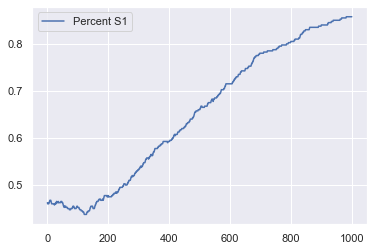
Exploring the Parameter Space¶
def get_percentS1(m):
'''
Find the % of agents playing the strategy S1.
'''
return np.sum([1 for a in m.schedule.agents
if a.strat == "S1"]) / m.schedule.get_agent_count()
variable_params = {"mutation": [0.0, 0.1, 0.2, 0.3]}
fixed_params = {"height": 20,
"width": 20,
"bias_S1": 0.5,
"update_type": "imitator",
"game": sh,
"num_changes_per_step": 1}
model_reporters = {"PercentS1": get_percentS1}
param_sweep = BatchRunner(GameLatticeModel,
variable_params,
fixed_params,
iterations=5,
max_steps=1000,
model_reporters=model_reporters,
display_progress=False)
param_sweep.run_all()
df = param_sweep.get_model_vars_dataframe()
df
| mutation | Run | PercentS1 | height | width | bias_S1 | update_type | game | num_changes_per_step | |
|---|---|---|---|---|---|---|---|---|---|
| 0 | 0.0 | 0 | 0.9125 | 20 | 20 | 0.5 | imitator | Bi matrix game with payoff matrices:\n\nRow pl... | 1 |
| 1 | 0.0 | 1 | 0.9275 | 20 | 20 | 0.5 | imitator | Bi matrix game with payoff matrices:\n\nRow pl... | 1 |
| 2 | 0.0 | 2 | 0.9100 | 20 | 20 | 0.5 | imitator | Bi matrix game with payoff matrices:\n\nRow pl... | 1 |
| 3 | 0.0 | 3 | 0.8650 | 20 | 20 | 0.5 | imitator | Bi matrix game with payoff matrices:\n\nRow pl... | 1 |
| 4 | 0.0 | 4 | 0.9525 | 20 | 20 | 0.5 | imitator | Bi matrix game with payoff matrices:\n\nRow pl... | 1 |
| 5 | 0.1 | 5 | 0.8250 | 20 | 20 | 0.5 | imitator | Bi matrix game with payoff matrices:\n\nRow pl... | 1 |
| 6 | 0.1 | 6 | 0.8450 | 20 | 20 | 0.5 | imitator | Bi matrix game with payoff matrices:\n\nRow pl... | 1 |
| 7 | 0.1 | 7 | 0.8050 | 20 | 20 | 0.5 | imitator | Bi matrix game with payoff matrices:\n\nRow pl... | 1 |
| 8 | 0.1 | 8 | 0.8025 | 20 | 20 | 0.5 | imitator | Bi matrix game with payoff matrices:\n\nRow pl... | 1 |
| 9 | 0.1 | 9 | 0.8025 | 20 | 20 | 0.5 | imitator | Bi matrix game with payoff matrices:\n\nRow pl... | 1 |
| 10 | 0.2 | 10 | 0.7400 | 20 | 20 | 0.5 | imitator | Bi matrix game with payoff matrices:\n\nRow pl... | 1 |
| 11 | 0.2 | 11 | 0.6700 | 20 | 20 | 0.5 | imitator | Bi matrix game with payoff matrices:\n\nRow pl... | 1 |
| 12 | 0.2 | 12 | 0.7025 | 20 | 20 | 0.5 | imitator | Bi matrix game with payoff matrices:\n\nRow pl... | 1 |
| 13 | 0.2 | 13 | 0.6675 | 20 | 20 | 0.5 | imitator | Bi matrix game with payoff matrices:\n\nRow pl... | 1 |
| 14 | 0.2 | 14 | 0.6825 | 20 | 20 | 0.5 | imitator | Bi matrix game with payoff matrices:\n\nRow pl... | 1 |
| 15 | 0.3 | 15 | 0.6600 | 20 | 20 | 0.5 | imitator | Bi matrix game with payoff matrices:\n\nRow pl... | 1 |
| 16 | 0.3 | 16 | 0.5525 | 20 | 20 | 0.5 | imitator | Bi matrix game with payoff matrices:\n\nRow pl... | 1 |
| 17 | 0.3 | 17 | 0.5725 | 20 | 20 | 0.5 | imitator | Bi matrix game with payoff matrices:\n\nRow pl... | 1 |
| 18 | 0.3 | 18 | 0.5725 | 20 | 20 | 0.5 | imitator | Bi matrix game with payoff matrices:\n\nRow pl... | 1 |
| 19 | 0.3 | 19 | 0.5750 | 20 | 20 | 0.5 | imitator | Bi matrix game with payoff matrices:\n\nRow pl... | 1 |
plt.scatter(df.mutation, df.PercentS1)
plt.title("Imitator, different games")
plt.ylabel("Percet S1")
plt.xlabel("mutation")
plt.grid(True)
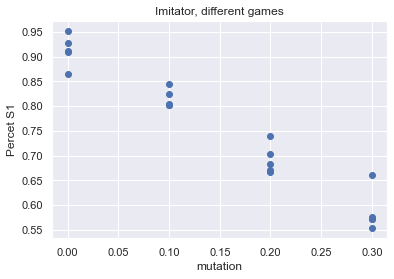
variable_params = {"game": [pd, pd2, coord, hilo, bos, sh, sh2]}
fixed_params = {"height": 20,
"width": 20,
"bias_S1": 0.5,
"update_type": "prob_imitator",
"mutation": 0.0,
"num_changes_per_step": 1}
model_reporters = {"PercentS1": get_percentS1}
param_sweep = BatchRunner(GameLatticeModel,
variable_params,
fixed_params,
iterations=10,
max_steps=1000,
model_reporters=model_reporters,
display_progress=False)
param_sweep.run_all()
df = param_sweep.get_model_vars_dataframe()
df
| game | Run | PercentS1 | height | width | bias_S1 | update_type | mutation | num_changes_per_step | |
|---|---|---|---|---|---|---|---|---|---|
| 0 | Bi matrix game with payoff matrices:\n\nRow pl... | 0 | 0.2375 | 20 | 20 | 0.5 | prob_imitator | 0.0 | 1 |
| 1 | Bi matrix game with payoff matrices:\n\nRow pl... | 1 | 0.2500 | 20 | 20 | 0.5 | prob_imitator | 0.0 | 1 |
| 2 | Bi matrix game with payoff matrices:\n\nRow pl... | 2 | 0.2900 | 20 | 20 | 0.5 | prob_imitator | 0.0 | 1 |
| 3 | Bi matrix game with payoff matrices:\n\nRow pl... | 3 | 0.2200 | 20 | 20 | 0.5 | prob_imitator | 0.0 | 1 |
| 4 | Bi matrix game with payoff matrices:\n\nRow pl... | 4 | 0.2425 | 20 | 20 | 0.5 | prob_imitator | 0.0 | 1 |
| ... | ... | ... | ... | ... | ... | ... | ... | ... | ... |
| 65 | Bi matrix game with payoff matrices:\n\nRow pl... | 65 | 0.1550 | 20 | 20 | 0.5 | prob_imitator | 0.0 | 1 |
| 66 | Bi matrix game with payoff matrices:\n\nRow pl... | 66 | 0.2450 | 20 | 20 | 0.5 | prob_imitator | 0.0 | 1 |
| 67 | Bi matrix game with payoff matrices:\n\nRow pl... | 67 | 0.1575 | 20 | 20 | 0.5 | prob_imitator | 0.0 | 1 |
| 68 | Bi matrix game with payoff matrices:\n\nRow pl... | 68 | 0.2875 | 20 | 20 | 0.5 | prob_imitator | 0.0 | 1 |
| 69 | Bi matrix game with payoff matrices:\n\nRow pl... | 69 | 0.2050 | 20 | 20 | 0.5 | prob_imitator | 0.0 | 1 |
70 rows × 9 columns
def convert_game_string(gstr):
if gstr == str(pd):
return "PD"
if gstr == str(pd2):
return "PD2"
if gstr == str(coord):
return "Coord"
if gstr == str(hilo):
return "HiLo"
if gstr == str(bos):
return "BoS"
if gstr == str(sh):
return "SH"
if gstr == str(sh2):
return "SH2"
return gstr
plt.scatter([convert_game_string(str(g)) for g in df.game], df.PercentS1)
plt.title("Prob Imitatory, different games")
plt.ylabel("Percet S1")
plt.xlabel("Game")
plt.grid(True)
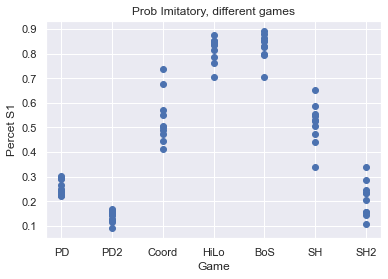
variable_params = {"game": [pd, pd2, coord, hilo, bos, sh, sh2],
"update_type": ["imitator", "prob_imitator"]}
fixed_params = {"height": 20,
"width": 20,
"bias_S1": 0.5,
"mutation": 0.0,
"num_changes_per_step": 1}
model_reporters = {"PercentS1": get_percentS1}
param_sweep = BatchRunner(GameLatticeModel,
variable_params,
fixed_params,
iterations=10,
max_steps=1000,
model_reporters=model_reporters,
display_progress=False)
param_sweep.run_all()
df = param_sweep.get_model_vars_dataframe()
df
| game | update_type | Run | PercentS1 | height | width | bias_S1 | mutation | num_changes_per_step | |
|---|---|---|---|---|---|---|---|---|---|
| 0 | Bi matrix game with payoff matrices:\n\nRow pl... | imitator | 0 | 0.0550 | 20 | 20 | 0.5 | 0.0 | 1 |
| 1 | Bi matrix game with payoff matrices:\n\nRow pl... | imitator | 1 | 0.0425 | 20 | 20 | 0.5 | 0.0 | 1 |
| 2 | Bi matrix game with payoff matrices:\n\nRow pl... | imitator | 2 | 0.0450 | 20 | 20 | 0.5 | 0.0 | 1 |
| 3 | Bi matrix game with payoff matrices:\n\nRow pl... | imitator | 3 | 0.0825 | 20 | 20 | 0.5 | 0.0 | 1 |
| 4 | Bi matrix game with payoff matrices:\n\nRow pl... | imitator | 4 | 0.1125 | 20 | 20 | 0.5 | 0.0 | 1 |
| ... | ... | ... | ... | ... | ... | ... | ... | ... | ... |
| 135 | Bi matrix game with payoff matrices:\n\nRow pl... | prob_imitator | 135 | 0.1675 | 20 | 20 | 0.5 | 0.0 | 1 |
| 136 | Bi matrix game with payoff matrices:\n\nRow pl... | prob_imitator | 136 | 0.1875 | 20 | 20 | 0.5 | 0.0 | 1 |
| 137 | Bi matrix game with payoff matrices:\n\nRow pl... | prob_imitator | 137 | 0.1825 | 20 | 20 | 0.5 | 0.0 | 1 |
| 138 | Bi matrix game with payoff matrices:\n\nRow pl... | prob_imitator | 138 | 0.2525 | 20 | 20 | 0.5 | 0.0 | 1 |
| 139 | Bi matrix game with payoff matrices:\n\nRow pl... | prob_imitator | 139 | 0.2950 | 20 | 20 | 0.5 | 0.0 | 1 |
140 rows × 9 columns
def convert_game_string(gstr):
if gstr == str(pd):
return "PD"
if gstr == str(pd2):
return "PD2"
if gstr == str(coord):
return "Coord"
if gstr == str(hilo):
return "HiLo"
if gstr == str(bos):
return "BoS"
if gstr == str(sh):
return "SH"
if gstr == str(sh2):
return "SH2"
return gstr
plt.scatter([convert_game_string(str(g)) for g in df[df["update_type"] == "imitator"].game],
df[df["update_type"] == "imitator"].PercentS1, label="Imitator")
plt.scatter([convert_game_string(str(g)) for g in df[df["update_type"] == "prob_imitator"].game],
df[df["update_type"] == "prob_imitator"].PercentS1, label="Prob Imitator")
plt.title("Different games")
plt.ylabel("Percet S1")
plt.xlabel("Game")
plt.legend(bbox_to_anchor=(1.05, 1))
plt.grid(True)
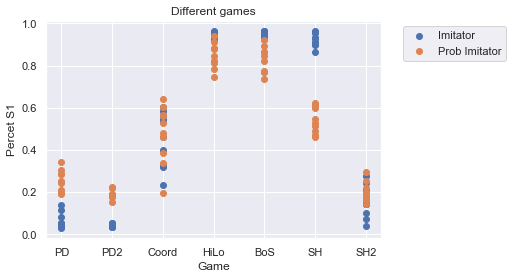
Games on Graphs¶
import networkx as nx
G = nx.Graph()
G.add_nodes_from([0,1,2,3,4,5,6,7])
G.add_edges_from([(0,1), (5, 1), (1,2), (2,3), (3,4), (4,5),(5,6), (6,7), (7,0)])
nx.draw(G, with_labels = True, font_color="white", font_size=14,font_weight='bold')
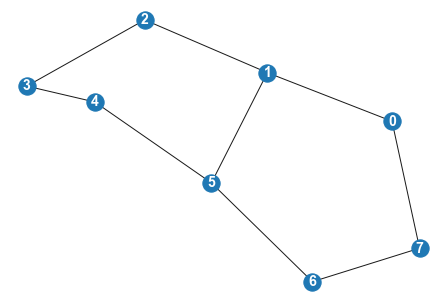
from mesa.space import NetworkGrid
# fix two strategies
S1 = np.array([1, 0])
S2 = np.array([0, 1])
STRATS = {
"S1": S1,
"S2": S2
}
class Player(Agent):
'''
A player for a game
'''
def __init__(self, unique_id, pos, model, strat):
super().__init__(unique_id, model)
self.pos = pos
self.strat = strat # fixed strategy to play in the game
def average_payout(self):
'''find the average payout when playing the game against all neighbors'''
neighbors_nodes = [a for a in self.model.network.get_neighbors(self.pos)]
neighbors = [a for a in self.model.schedule.agents if a.pos in neighbors_nodes]
return np.average([self.model.game[STRATS[self.strat], STRATS[n.strat]][0] for n in neighbors])
def total_payout(self):
'''find the total payout when playing the game against all neighbors'''
neighbors_nodes = [a for a in self.model.network.get_neighbors(self.pos)]
neighbors = [a for a in self.model.schedule.agents if a.pos in neighbors_nodes]
return np.sum([self.model.game[STRATS[self.strat], STRATS[n.strat]][0] for n in neighbors])
class GameNetworkModel(Model):
'''
Play a fixed game on a lattice.
'''
def __init__(self, game, bias_S1, mutation, update_type, network):
self.height = height
self.width = width
self.game = game
self.bias_S1 = bias_S1
self.update_type = update_type
self.num_changes_per_step = num_changes_per_step
self.mutation = mutation
self.schedule = RandomActivation(self)
self.network = NetworkGrid(network)
self.datacollector = DataCollector(
{"Percent S1": lambda m: np.sum([1 for a in m.schedule.agents
if a.strat == "S1"]) / m.schedule.get_agent_count()} )
self.running = True
# Set up agents
agent_id = 0
for n in network.nodes:
strat = "S1" if random.random() < self.bias_S1 else "S2"
agent = Player(agent_id, n, self, strat)
self.network.place_agent(agent, n)
self.schedule.add(agent)
agent_id += 1
def step(self):
for i in range(self.num_changes_per_step):
# choose a random agent
focal_agent = np.random.choice(self.schedule.agents)
# find all the neighbors of the agent
neighbors_nodes = [a for a in self.network.get_neighbors(focal_agent.pos)]
neighbors = [a for a in self.schedule.agents if a.pos in neighbors_nodes]
if self.update_type == 'imitator':
# imitate most successful neighbor
total_payouts = {a: a.total_payout() for a in neighbors}
max_payout = max(total_payouts.values())
strat_to_imitate = [a.strat for a in total_payouts.keys() if total_payouts[a] == max_payout][0]
if self.update_type == 'prob_imitator':
# get the average payouts for each neighbor
average_payouts = [a.average_payout() for a in neighbors]
total_average_payouts = np.sum(average_payouts)
# probabilities for each neighbor
neighbor_probs = [n.average_payout() / total_average_payouts for n in neighbors]
# probabilistically imitate most successful neighbor
strat_to_imitate = np.random.choice(neighbors, 1, p=neighbor_probs)[0].strat
# mutations
other_strat = "S2" if strat_to_imitate == "S1" else "S1"
if random.random() < self.mutation:
focal_agent.strat = other_strat
else:
focal_agent.strat = strat_to_imitate
self.datacollector.collect(self)
# stop running if all agents have the same strategy
if len(list(set([a.strat for a in self.schedule.agents]))) == 1:
self.running=False
height, weight = 10, 10
bias_S1 = 0.5
mutation = 0
update_type = "prob_imitator"
game = sh
model = GameNetworkModel(game,
bias_S1,
mutation,
update_type,
G)
for i in tqdm.tqdm(range(100)):
# initialize the model
model.step()
if not model.running:
break
model_out = model.datacollector.get_model_vars_dataframe()
model_out.plot();
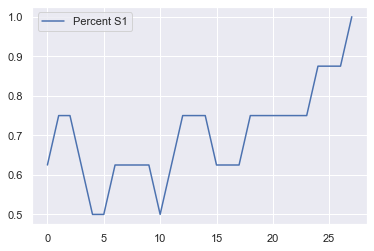
G = nx.cycle_graph(100)
nx.draw(G, pos=nx.circular_layout(G),
with_labels = True,
font_color="white",
font_size=14,
font_weight='bold')
bias_S1 = 0.5
mutation = 0
update_type = "imitator"
game = pd
model = GameNetworkModel(game,
bias_S1,
mutation,
update_type,
G)
for i in tqdm.tqdm(range(500)):
# initialize the model
model.step()
if not model.running:
break
model_out = model.datacollector.get_model_vars_dataframe()
model_out.plot();
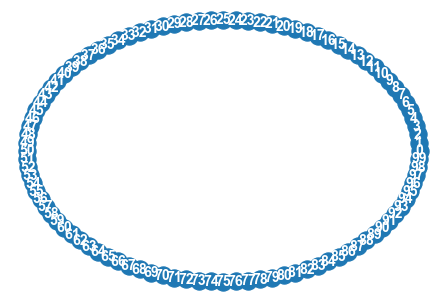
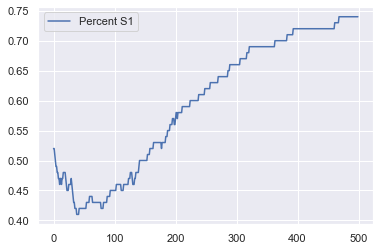
G = nx.star_graph(20)
nx.draw(G, pos=nx.circular_layout(G), with_labels = True, font_color="white", font_size=14,font_weight='bold')
bias_S1 = 0.5
mutation = 0
update_type = "imitator"
game = sh
model = GameNetworkModel(game,
bias_S1,
mutation,
update_type,
G)
for i in tqdm.tqdm(range(500)):
# initialize the model
model.step()
if not model.running:
break
model_out = model.datacollector.get_model_vars_dataframe()
model_out.plot();
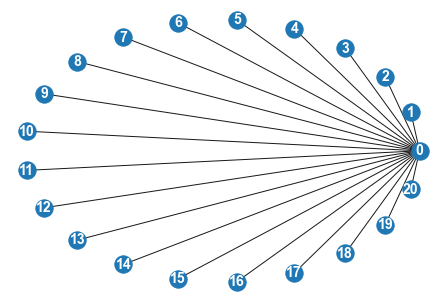
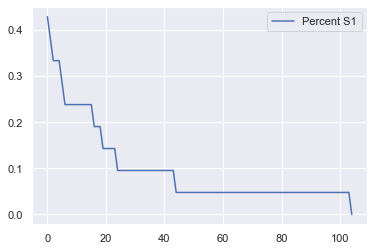
G = nx.complete_graph(20)
nx.draw(G, pos=nx.circular_layout(G), with_labels = True, font_color="white", font_size=14,font_weight='bold')
bias_S1 = 0.5
mutation = 0
update_type = "imitator"
game = coord
model = GameNetworkModel(game,
bias_S1,
mutation,
update_type,
G)
for i in tqdm.tqdm(range(500)):
# initialize the model
model.step()
if not model.running:
break
model_out = model.datacollector.get_model_vars_dataframe()
model_out.plot();
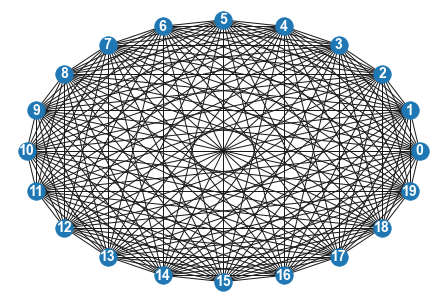
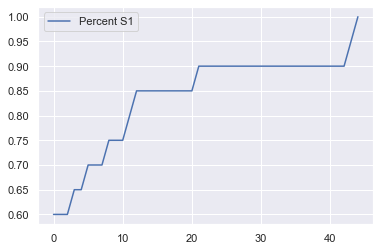
G = nx.petersen_graph()
nx.draw(G, pos=nx.circular_layout(G), with_labels = True, font_color="white", font_size=14,font_weight='bold')
bias_S1 = 0.5
mutation = 0
update_type = "imitator"
game = pd2
model = GameNetworkModel(game,
bias_S1,
mutation,
update_type,
G)
for i in tqdm.tqdm(range(500)):
# initialize the model
model.step()
if not model.running:
break
model_out = model.datacollector.get_model_vars_dataframe()
model_out.plot();
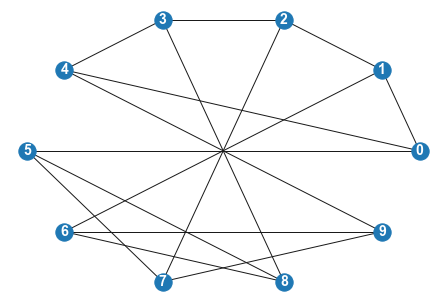
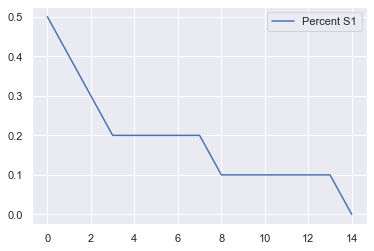
G = nx.erdos_renyi_graph(20, 0.2)
nx.draw(G, pos=nx.circular_layout(G), with_labels = True, font_color="white", font_size=14,font_weight='bold')
bias_S1 = 0.5
mutation = 0
update_type = "imitator"
game = pd
model = GameNetworkModel(game,
bias_S1,
mutation,
update_type,
G)
for i in tqdm.tqdm(range(500)):
# initialize the model
model.step()
if not model.running:
break
model_out = model.datacollector.get_model_vars_dataframe()
model_out.plot();
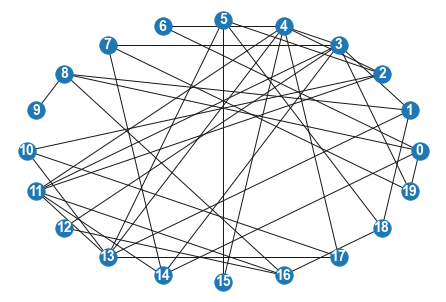
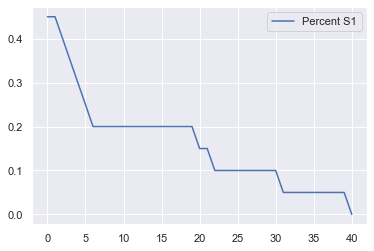
Further Reading¶
M. Jackson and Y. Zenou (2014). Games on Networks, In: Handbook of Game Theory Vol. 4, edited by Peyton Young and Shmuel Zamir, Elsevier Science.
P. Forber and R. Smead (2014). The evolution of fairness through spite, Proceedings of the Royal Society B: Biological Sciences 281 (1780).
P. Forber and R. Smead (2014). An Evolutionary Paradox for Prosocial Behavior, The Journal of Philosophy, 11:3, pp. 151 - 166
J. McKenzie Alexander and P. Vanderschraaf (2005). Follow the Leader: Local Interactions with Influence Neighborhoods, Philosophy of Science, pp. 86 - 113.
